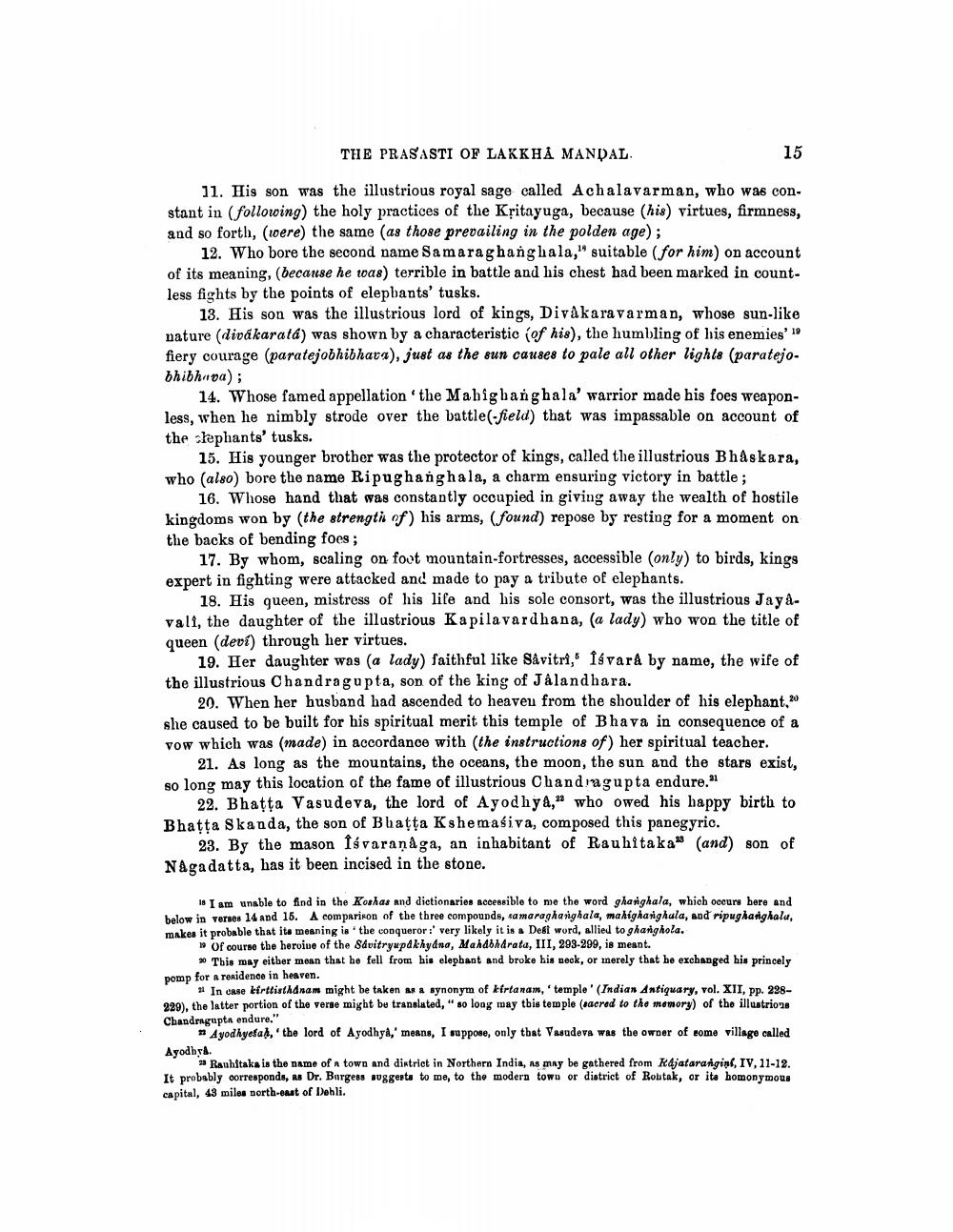________________
THE PRASASTI OF LAKKHÁ MANDAL
15
11. His son was the illustrious royal sage called Achalavarman, who was constant in following) the holy practices of the Kritayuga, because (his) virtues, firmness, and so forth, (were) the same (as those prevailing in the polden age);
12. Who bore the second name Samaraghanghala, suitable for him) on account of its meaning, (becanse he was terrible in battle and his chest had been marked in countless fights by the points of elepbants' tusks.
13. His son was the illustrious lord of kings, Divakara varman, whose sun-like nature (divákaratá) was shown by a characteristic of his), the humbling of his enemies' 19 fiery courage (paratejobhibhava), just as the sun causes to pale all other lights (paratejo. bhibhava);
14. Whose famed appellation the Mahigbanghala' warrior made his foes weaponless, when he nimbly strode over the battle(-field) that was impassable on account of the elephants' tusks.
15. His younger brother was the protector of kings, called the illustrious Bhaskara, who (also) bore the name Ripughanghala, a charm ensuring victory in battle ;
16. Whose hand that was constantly occupied in giving away the wealth of hostile kingdoms won by the strength of his arms, found) repose by resting for a moment on the backs of bending foes ;
17. By whom, scaling on foot mountain-fortresses, accessible (only) to birds, kings expert in fighting were attacked and made to pay a tribute of elephants.
18. His queen, mistress of his life and his sole consort, was the illustrious Jayavali, the daughter of the illustrious Kapilavardhana, (a lady) who won the title of queen (devi) through her virtues.
19. Her daughter was (a lady) faithful like Såvitri, Isvará by name, the wife of the illustrious Chandragupta, son of the king of Jalandhara.
20. When her husband had ascended to heaveu from the shoulder of his elephant. she caused to be built for his spiritual merit this temple of Bhava in consequence of a vow which was (made) in accordance with the instructions of her spiritual teacher.
21. As long as the mountains, the oceans, the moon, the sun and the stars exist, so long may this location of the fame of illustrious Chandragupta endure."
22. Bhatta Vasudeva, the lord of Ayodhya," who owed his happy birth to Bhatta Skanda, the son of Bbatta Kshemasiva, composed this panegyric.
23. By the mason Isvaraņåga, an inhabitant of Rauhitaka" (and) son of Nagadatta, has it been incised in the stone.
18 I am unable to find in the Koshas and dictionaries accessible to me the word ghanghala, which occurs bere and below in verses 14 and 15. A comparison of the three compounds, camaraghanghala, mahigharghula, and ripughanghalu, makes it probable that its meaning is the conqueror :' very likely it is a Debt word, allied to ghanghola.
1. Of course the heroive of the Savitryupdkhydna, Mahabharata, III, 293-299, is meant.
* This may either mean that he fell from his elephant and broke his neck, or inerely that he exchanged his princely pomp for a residence in heaven.
In case kirtlisthdnam might be taken as a synonym of kirtanam,"temple' (Indian Antiquary, vol. XII, pp. 228229), the latter portion of the verse might be translated," so loag may this temple (sacred to the monory) of the illustrious Chandragapta endure."
*Ayodhyefar, the lord of Ayodhya,' means, I suppose, only that Vasudeva was the owner of some village called Ayodhya
23 Rauhitaka is the name of town and district in Northern India, as may be gathered from Kæjatarangini, IV, 11-12. It probably corresponds, as Dr. Barges suggests to me, to the modern towu or district of Routak, or ita homonymous capital, 43 miles north-east of Debli.




